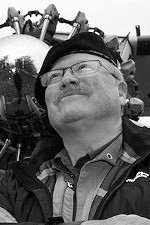 Rob Stapleton, President
Rob Stapleton, President
Rob Stapleton arrived in Alaska from Southern California in 1975 to work as a photojournalist for the Anchorage Daily News. He has traveled the state for more than 40 years making images of Alaska’s cultures and covering stories for newspapers, wire services, magazines, books and websites. His freelance work includes images from China, Japan, Russia and South America for the AP, UPI, Time, Life, Der Stern, Paris Match, La Figaro, and Sports Illustrated.
After making friends with Iditarod founder Joe Redington, Stapleton was invited on the 1979 Redington Butcher Expedition to take a team of sled dogs to the 20,320-foot summit of Mt. Denali where he documented the first and only successful dog team to make the summit.
On another front, Stapleton started flying with his father at the Santa Paula, California, Airport when he was 10 years-old and achieved his solo flight on his 16th birthday. He later earned a license to fly single engine land aircraft. With the advent of the Sport Pilot rule in 2004, he built and flew a Weight Shift Experimental Light Sport Aircraft at Birchwood Airport. In addition, he earned a Basic Flight Instructor rating and later an FAA Advanced Ground Instructor rating to held Sport Pilot Knowledge workshops and individual instruction.
Stapleton’s interest in the Alaska aviation has also led to many of his stories being published by aviation media. A former board member of the Alaska Airmen Association and the Alaska Aviation Museum, Stapleton has been become widely known in this field, and is the author of a book entitled Alaska Bush Pilots. He is also one of the founders of the Alaska Aviation Hall of Fame which honors pioneers with a magazine and annual banquet through the Alaska Air Carriers Association.
In addition the cinematographer produces television programs on Fox and ABC in Anchorage, and has served as chair of AMIPA since 2014.
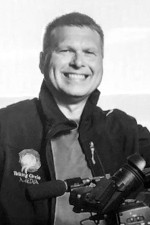 Jonathan Butzke, Vice President
Jonathan Butzke, Vice President
Owner of Talking Circle Media featuring video, website and software design, Jon Butzke has 35 years of filming rural Alaska, His company, which he founded in 1989, is the largest full-service video, television, film, a/v event support, and live internet production company in the state.
Part Inupiaq Eskimo from Nome, Butzke is also proud to note that his grandfather was O.D. Cochran, who was the Territorial Senator who wrote and sponsored the anti-discrimination act in Alaska that abolished discrimination against Alaska Natives.
Butzke graduated from Dimond High School in Anchorage and for four years attend Alaska Pacific University, where he founded the student newspaper and studied International Communications. Then he followed up with studies in journalism, public relations, and advertising at University of Alaska Anchorage.
Although he has 25 years of experience in Alaskan real estate, including an investment in the For Sale By Owner System LLC, Butzke is best known for his work in media. IMDB, the Internet Movie Database, credits his productions, and a multipage listing of his long format and broadcast projects covers more than 150 villages every region of Alaska.
The cinematographer is a member, and former chairperson of the Denali Jaycees. He has served on the board of the Alaska Moving Image Preservation since 2008 and is a founding member, on the board of directors, and treasurer of the Alaska Native Media Group.
 Evan Rose, Treasurer
Evan Rose, Treasurer
Evan Rose is the CEO of the Alaska Permanent Capital Management, a local firm that manages over $3 billion. He also serves as a trustee of the Frances and David Rose Foundation.
He was born and raised in Anchorage. Rose is a board member and formerly chair of the Anchorage Museum at Rasmuson Center. In addition, he serves as a board member of the Anchorage Museum Association, a former board member of the Perseverance Theatre, and as treasurer of Alaska Moving Image Preservation Association.
He has a BA in finance from the University of Oregon and an MBA from the University of Washington in business administration.
 Steve Levi, Secretary
Steve Levi, Secretary
Steven Levi is a commercial and technical writer living in Anchorage. He has more than 90 books on the market ranging from history to mystery, self-help to creative thinking, and poetry to biography. He is a member of authormasterminds.com, a collection of writers whose books are “different.”
Levi specializes in a unique brand of mysteries: the impossible crime. An impossible crime requires the detective to solve HOW a crime was committed before he can arrest the perpetrators. In The Matter of the Vanishing Greyhound, a bus with bank robbers being pursued by the police vanishes off the Golden Gate Bridge. Before the detective can capture the criminals, he has to figure out how they were able to “disappear.” His work of impossible crime short stories, The Matter of the Duct Tape Tuxedo, has just been released. (Why would anyone want to steal 8,000 gallons of water? Read the book and find out!)
When it comes to history, Levi specializes in the Alaska Gold Rush. So few Americans know about the Alaska Gold Rush that when you pull it up on the internet, the Klondike Strike comes up. That rush, made famous by Jack London and Robert Service, was centered in Dawson in the Yukon Territory of Canada and lasted about 15 months. The Alaska Gold Rush starts in Juneau in 1880 and its heyday ended with the First World War. The Klondike Strike was concentrated in an area about 30 miles by 30 miles; the Alaska Gold Rush covered an area equivalent to one-fifth of the Lower 48. Levi’s scholarly history of the Alaska Gold Rush–Boom and Bust in the Alaska Gold Fields—is an in-depth examination of the era. His companion book, The Human Face of the Alaska Gold Rush, is a compendium of the interesting tidbits of that era.
Steve Levi is the historian on the board and has been a member since the formation of AMIPA.
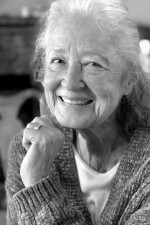 Francine Lastufka Taylor, Founder
Francine Lastufka Taylor, Founder
Francine Lastufka Taylor can trace her ancestry back to the court of Maximilian in Mexico. Her father, an executive for Procter and Gamble, was French Canadian, part Blackfoot and Sioux. Raised in Southern California, Francine Lastufka Taylor majored in music at Sacramento State until her husband was assigned to cover Alaska by a major pharmaceutical company in 1961.
Later, in the early 1970s, she turned her attention to media. Enrolling at the University of Alaska Anchorage she became its first communications graduate and started her own production company producing as many as six documentaries a year.
Although new to the field, Tayler became concerned that most of Alaska’s historic moving images and audio records of that era would soon be lost to future generations unless someone stepped up to preserve them. Finally, in 1991, she founded Alaska Moving Image Preservation Association in her garage.
With the help of librarians, broadcasters, producers, other concerned citizens, and the American Film Institute’s National Center for Film and Video Production, she and the AMIPA board managed to fund climate-controlled storage facilities and professional archivists to run the operation. Eventually, although still a board run non-profit, the organization was moved to the University of Alaska Anchorage campus where it is housed in the Consortium Library with the additional support of Alaska Pacific University.
As a result of her efforts, Taylor has received numerous honors including the Alaska Press Women’s Lifetime Achievement Award, and nomination to Alaska Women’s Hall of Fame. She is also active in Alaska musical circles and remains an AMIPA board member.
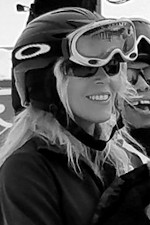 Carole Anderson
Carole Anderson
Born in Évreux, France, and spending her formative childhood years in Tokyo, Japan, as the daughter of a U.S.A.F. military commander, Carole Anderson has endeavored throughout her life to maintain a global perspective and to be a true citizen of the world.
Anderson began her media career in Fairbanks, Alaska at KATN-TV and later worked at KUAC-TV. Freelance assignments included TeleJapan International in Tokyo, Japan, and also VOA/TV Martí in Washington D.C. For her endeavors at WUSA-TV (CBS/Gannett) she was honored to receive the Women in Engineering CBS Award. At the FCC Advanced Television Test Center (A.T.T.C.) laboratory, Carole served as a Data Analyst on the engineering team, testing prototypes to develop and standardize the U.S. Digital HDTV System. She received an Emmy Award for Television Technology and Engineering.
Upon return to Alaska, she pursued international interests in Arctic affairs, taking on public relations and research analysis roles at the Northern Forum and the Institute of the North, organizations both founded by Governor Walter J. Hickel. She subsequently served as his aide during his final years.
Anderson is deeply involved in the Anchorage community, coaching alpine skiing and power-lifting for Special Olympics and serving on the advisory council of CSS Clare House. As the President of the board of the Japan Relief Fund of Alaska, an organization which raised funds for the Japanese Red Cross after the 3/11/11 triple disaster, she was honored to accept the 2013 Governor’s North Star Award for International Excellence for Humanitarian Endeavors. She currently serves on the boards of the Alaska World Affairs Council, the Japan Alaska Association (JAA), Perseverance Theatre, and the Alaska Moving Image Preservation Association (AMIPA).
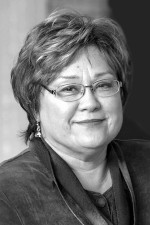 Rhonda McBride
Rhonda McBride
Rhonda McBride has a long history of working in both television and radio in Alaska, going back to 1988, when she was news director at KYUK, the public radio and TV station in Bethel, which broadcasts in both the English and Yup’ik languages.
From the Kuskokwim 300 Sled Dog Race— to the revival of the Yup’ik language—to the fight to protect the subsistence way of life, McBride was immersed in Alaska Native culture and history on a daily basis. It was one of the best jobs she ever had, she recalls, because she got to work alongside pioneering Yup’ik broadcasters, who incorporated modern technology with traditional story telling skills to preserve their language and culture.
After almost ten years in Bethel, McBride moved on to the Alaska Public Radio Network in Anchorage. She was also a public television producer at KAKM-Channel 7, where she hosted public affairs programs and moderated the election series, running. Later she worked at KTUU-Channel 2 and KTVA-Channel 11, where she covered politics, economics, rural and Alaska Native issues.
In her more than 30 years as a journalist in Alaska, she has strived to bridge the state’s urban/rural divide by introducing Alaskans to each other. “The closest distance between two people is a story,” she insists. And the story of how things got to be the way they are today is a recurring theme in her work, in which she’s profiled many historical and political figures -- and tackled big issues like Alaska’s epidemic of domestic violence and sexual assault, alcohol and drug addiction, the rural dental health crisis and historical trauma.
The boards newest recruit, these projects introduced McBride to AMIPA’s archives which she tapped on a regular basis when she began to host and produce KTVA’s Frontiers program, an award-winning weekly magazine show, which showcased Alaska’s history, politics, economy and Native cultures.